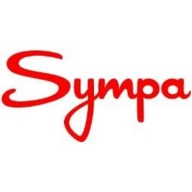

PeopleSoft and Sympa HR are HR management solutions in competition, with Sympa HR often having the upper hand in features and pricing, while PeopleSoft stands out in deployment capabilities.
Features: PeopleSoft includes comprehensive HR management with payroll, analytics, and seamless ERP integration, suitable for large-scale enterprises. It also offers robust analytical tools. Sympa HR focuses on a user-friendly experience, excelling in recruitment and employee engagement, making it more appealing to midsize businesses, with features geared towards enhancing employee experience.
Ease of Deployment and Customer Service: PeopleSoft requires significant implementation time due to its complexity but offers extensive scalability and integration options. Sympa HR features a streamlined deployment with agile support, benefiting smaller teams without extensive IT resources. PeopleSoft provides strong customer service, though it can be resource-intensive, while Sympa HR offers agile support.
Pricing and ROI: PeopleSoft involves high upfront costs, with potential for significant ROI in large organizations that can leverage its full capabilities. Sympa HR offers a cost-effective option with lower initial costs, allowing for a quicker ROI for smaller entities due to its pricing model.
| Product | Market Share (%) |
|---|---|
| PeopleSoft | 3.1% |
| Sympa HR | 0.8% |
| Other | 96.1% |
| Company Size | Count |
|---|---|
| Small Business | 27 |
| Midsize Enterprise | 16 |
| Large Enterprise | 50 |
PeopleSoft is an ERP solution that provides businesses with tools for managing their entire workforce including human resources and financial operations, such as payroll, benefits, talent management, and supply chain management. Originally developed by PeopleSoft, Inc., and later acquired by Oracle Corporation, the software helps address talent management needs and maximize employee productivity and efficiency.
PeopleSoft Features
PeopleSoft has many valuable key features. Some of the most useful ones include:
PeopleSoft Benefits
There are many benefits to implementing PeopleSoft. Some of the biggest advantages the solution offers include:
Reviews from Real Users
PeopleSoft is a solution that stands out when compared to many of its competitors. Some of its major advantages are that it has a lot of functionality and is customizable.
A Regional Director at a tech services company mentions, “The most valuable feature is that it's wide and broad and it does about everything anybody needs in a major organization from a back-office systems point of view.”
"PeopleSoft is a good core system. It has a lot of functionality. "They frequently update the solution and recently they have added some good enhancement features for higher education. We just switched to the new fluid interface and that is working very well for us. It is very good," says another reviewer who is an HR/Pay Systems Administrator/Director at a university.
A Senior Manager for DevOps Infrastructure at a financial services firm, explains why he finds the solution so beneficial: "It is a customizable product. We can customize it based on our needs, which is one of the features that I like about PeopleSoft. As far as financial accounting is concerned, the user interface is very good. You can also configure a Chart of Accounts for all performance insights."
Sympa HR was designed to support HR professionals all across the world. We provide local and international companies with an aggregated, clear view of all their people data and offer unlimited integrations to other software. Reliable HR data and flexible tools are a necessity for efficient HR work during times of change. Sympa HR helps you keep track of all your processes in one place, supports smart decision-making and helps automate routine tasks. Backed up with great customer support, it is currently used by hundreds of organisations worldwide and has one of the highest customer satisfaction rates of any HR technology in Europe.
We monitor all Talent Management reviews to prevent fraudulent reviews and keep review quality high. We do not post reviews by company employees or direct competitors. We validate each review for authenticity via cross-reference with LinkedIn, and personal follow-up with the reviewer when necessary.